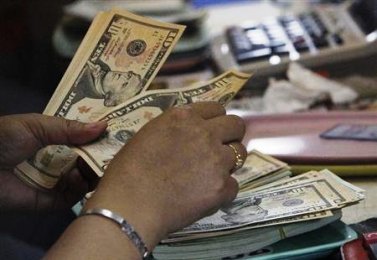Sudan’s finance minister expects further decline in USD exchange rate
October 1, 2014 (KHARTOUM) – The minister of Finance and National Economy Sudanese Badr al-Din Mahmoud said that the country’s foreign exchange reserve position has improved after recent economic reforms and increased Forex inflows.

He described the current exchange rate as inflated adding that the real price should be no more than 7.00 SDG.
The official exchange rate is 5.7.
The exchange rate of the USD in informal market witnessed a big drop on Wednesday to 8.70 SDG from of 9.10 pounds on Tuesday which is the largest single day drop in months.
The USD dropped last Sunday to 9.10 SDG from 9.50 amid fears by traders of further decline.
The black market for currency saw a drop in demand after crackdown by authorities during the past few days.
The finance minister disclosed that Forex inflows increased by 18% coupled with rationalization of demand for imports by more than 15%, calling it a good step that led to a rise in the value of the pound against foreign currencies since last month.
According to the International Monterey Fund (IMF) report last month, Sudan’s foreign exchange reserves stood at $1.5 billion in March 2014 , a decline of $83 million over the end of 2013.
The IMF projects the reserves to reach $1.7 billion in 2014 and $2.0 billion in 2015.
Sudan has seen its economy take a nosedive after the south became independent in July 2011, taking with it three-quarters of the united country’s oil output.
Oil was the main driver of the Sudanese economy fueling an economic boom particularly after signing the 2005 Comprehensive Peace Agreement (CPA).
The Sudanese government was forced to introduce an austerity budget that saw the partial lifting of fuel and food subsidies which triggered demonstrations across the country in 2012 and 2013.
Sudan also imposed restrictions on sale of foreign currency and imports to preserve the already low levels of Forex held by the central bank.
Later the government also moved to effectively devalue the currency which came under enormous pressures as a result of a big shortage in foreign currencies.
Because banks and Forex bureaus are unable to supply enough dollars, the black market rate is seen as the benchmark for the real market value of the pound.
Since 2012, Sudanese authorities started rounding up currency traders after the central bank announced that it will prosecute anyone dealing in the black market.
(ST)
